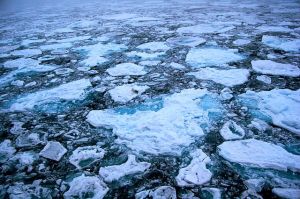Beyond the Bubble – Ice, Shale and Raindrops
by jacobbhunter

Image: Brocken Inaglory. License: (CC BY-SA 3.0)
Today, while taking a moment away from listening to deadlines crash about my ears, I watched an episode of the Simpsons. In it, Lisa turns to the internet to research her latest school report ‘Springfield, 50 years from now’ and becomes utterly despairing at the dire predictions she finds. Unable to live with the vision of environmental apocalypse now filling her mind, she submits to mood-altering prescription drugs.
Hopefully nothing I pull from the big cabinet of news this week will cause quite such disquiet for you, but there’s nothing quite like a crisis to focus the mind.
Reports that British flour mills are importing around 2 million tonnes of wheat, more than double last year’s figure, certainly provide food for thought. A dire harvest naturally follows a very poor growing season and we were gripped by unfavorable weather for much of the year. As climate change alters global rainfall and temperature patterns I’ve often wondered what that will mean for our monoculture-based agriculture. This collection of articles from the French National Institute for Agricultural Research is full of interesting stuff, including a discussion of food security in the face of changing climate (page 63).

Arctic ice by Pink floyd88 a, licensed under (CC BY-SA 3.0)
The first liquified natural gas transport ship to pass across the Arctic region on its journey from Norway to Japan did so this month, and its progress had a somewhat chilling effect on me. Reduced ice cover and the changing gas market has made the trip viable. It’s not the only way in which the polar region has become relevant to fossil-fuel exploitation – rising prices and thinning ice have presented opportunities to exploit the Arctic’s large reserves, despite the risks. Hunting around, I also came across this article which while a little old touches on some of what this new Arctic usefulness might mean for its indigenous people.
Citizens of the UK too have hard choices to make about the way they choose to exploit their fossil-fuel reserves. Growing support for fracking, rising prices and significant reserves in Lancashire mean that the chancellor is poised to ‘put shale gas on a fast track’. Who knows what his constituents will make of that.
Beyond the Earth, there has been a bit of excitement from NASA’s newest and most impressive Mars rover. Curiosity appeared to find organic compounds in a recent soil sample, which could have come from life on Mars. Or it could just be contamination left on the rover from closer to home. We won’t know for a while, sadly.

Not the fossil raindrops in question. Image by Verisimilus. License: (CC BY-SA 3.0)
Before I sign off I think I will mention one further story, simply because it amused me. Often, great scientific progress comes about because of what in retrospect seems like beautifully simple insight or experiment. I’m not sure if estimating the density of the atmosphere from the impressions left by raindrops some three-billion-years-ago counts as beautiful insight, but it’s certainly a neat idea.

